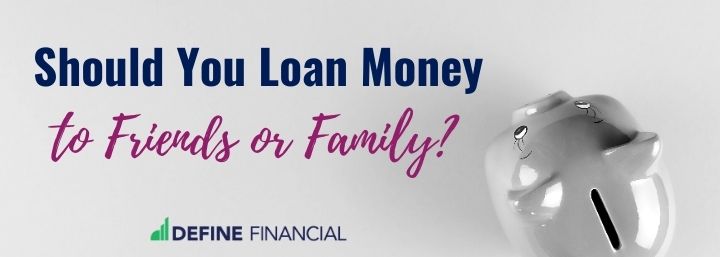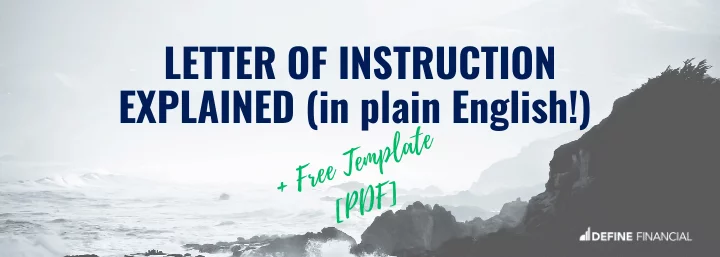
Has a friend or family member asked you to borrow money?
Maybe they need cash to start a business, want to a buy a new home, or have fallen on hard times.
Whatever the reason, the question of whether you should loan money to family and friends still remains.
We’ll dive into the pros and cons of giving a family loan to help you decide whether it’s right for you.
Family Loan or Personal Gift?
Before you decide to loan money to family or friends, you should stop and think about what that really means to your own finances and future.
In reality, many loans to family and friends are not paid back in full – or ever paid back at all.
So if you have the financial resources to make it happen, you might consider it as offering a gift instead. That means, you may not ever get the money back.
If you ever get the money back, that’s great. If not, then that’s okay because you weren’t expecting to receive repayment.
In this scenario, you’re giving a loan with the intention of helping someone but you also realize that you may never see your money again.
However, you should never loan to family or friends to score a better investment return than what your savings account currently offers. Since interest rates are so low, you may be thinking about lending money so you can get a better rate of return than what you can get elsewhere.
The thing is, the better rate you *could* receive from a loan to a friend won’t be nearly high enough to make up for the risk of doing it. This is because it’s very likely they don’t qualify for a loan from a bank or a credit card.
And if they can’t qualify for traditional financing, this means they’re a high risk.
Is Loaning Money to Friends or Family a Good Way to Make Money?
If you are able to push the politics of personal relationships aside, loaning money to someone you know is a poor investment. Here’s why:
- High Risk
- Limited Return
In the world of investing, there are two types of investments: high-risk and low-risk investments. If an investment is risky, it should theoretically offer a high investment return to make up for that risk.
Stocks are a great example of this type of investment because they come with a great deal of risk. As such, investors in stocks have been handsomely rewarded over the last century. In short, stocks come with:
- High risk
- Potentially unlimited return
But, for many investors, investing exclusively in stocks comes with too much risk. Enter other investments, such as cash and United States Treasury bonds. These investments are relatively safe. As a result, these investments offer a limited return. In short, U.S. Treasury bonds are:
- Low-risk
- Limited return
Now, let’s look at that family loan once again. These loans come with a lot of risk because you have no guarantee the person will pay you back. Further, the fact they’re borrowing money from you and not from a bank means they probably have poor credit or limited financial resources.
This scenario doesn’t really bode well in terms of getting your money back. On the flip side, you can’t charge your family member a super high interest rate to make up for that risk.
Formalizing a Friend or Family Loan
If you decide that you want to gift money to a friend or a family member, you can always formalize the arrangement.
In other words, you could write up the terms and conditions of your loan and put the entire deal in writing.
There are even some independent third parties that can help you structure a loan arrangement. Some may even process and record loan payments on your behalf.
If you’re not comfortable with gifting money to your friend or family member, you may also want to consider pointing in them in the direction of some unconventional financing options where they can get a loan – even if they have poor credit.
Crowd-sourced lending has become fairly competitive in the loan financing space. Here are a few crowded-sourced lending options they could consider:
While crowdfunding websites offer loans to people who can’t or don’t want to get money elsewhere, these sites also let people invest their money in these high-risk loans. That’s why it’s called “crowdfunding” – because the loans are funded by individual investors like yourself.
If you’re wondering if you should invest in one of these platforms, I still believe the answer is “no.”
This is because the same principle applies – these loans are high-risk, yet they don’t offer a high enough rate of return to make up for that risk.
Remember, most people who get loans through Lending Club or Prosper do so because they can’t get a loan from a traditional bank.
As an investor, it may not make sense for you to bet on someone a bank doesn’t want to work with.
Personal Loans to Friends or Family is Not a Good Investment
If you have a loved one in your life who is in a pinch financially, remember that you’re not required to loan them money.
Maybe you want to give them a financial gift instead. In the worst case scenario, they will never pay you back. However, since it was a gift, you won’t be left waiting for your money, either.
And, if you don’t want to loan money out, it’s good to know the people in your life have other options. Borrowing money from a crowd-sourcing platform may be a bad deal for your friend, but borrowing from you is a bad deal for you.


